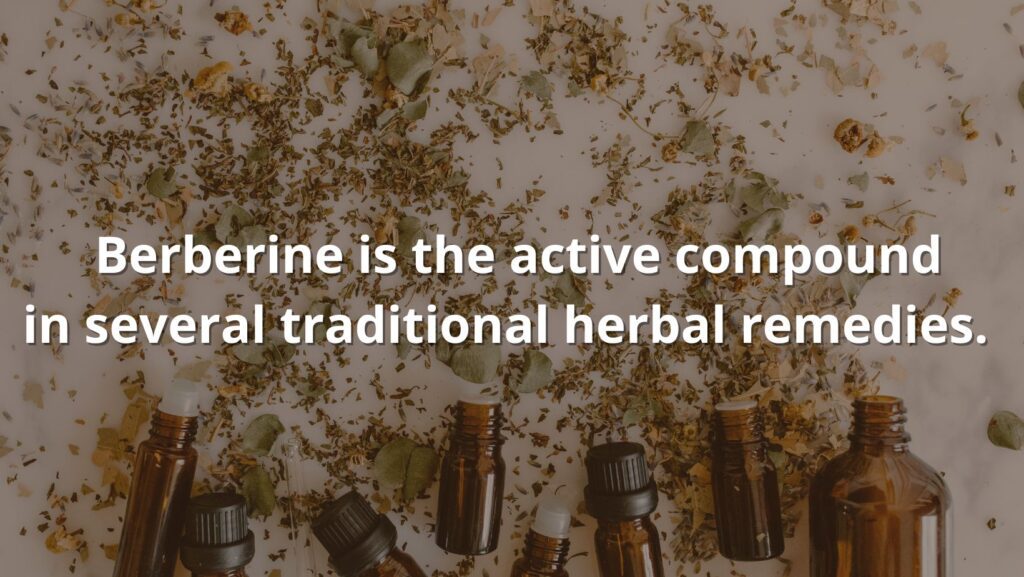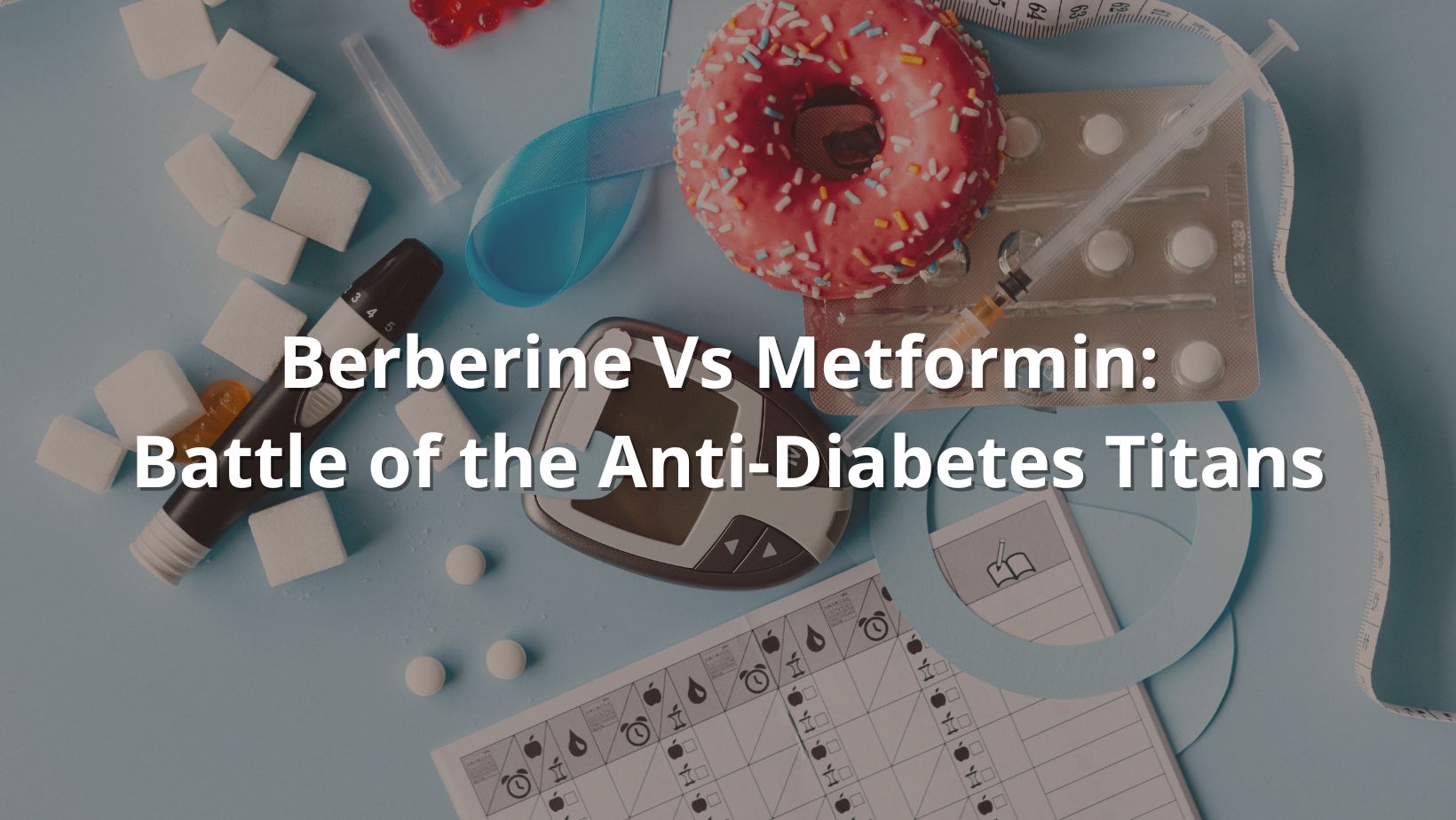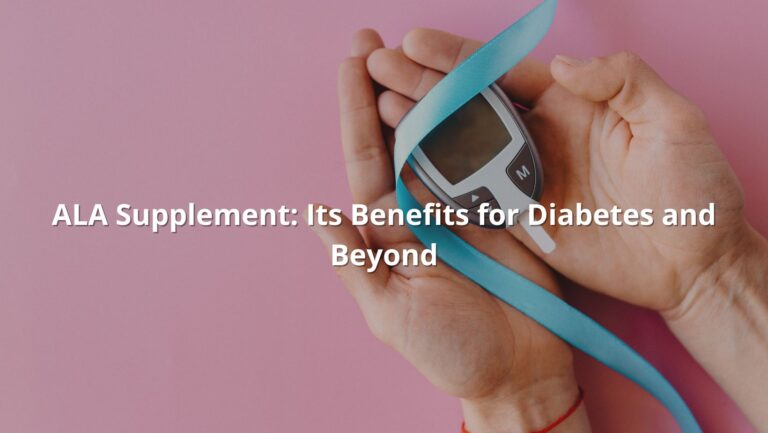Berberine Vs Metformin: Battle of the Anti-Diabetes Titans
Berberine has recently resurfaced online and some people even call it “nature’s Ozempic”. But how does it really compare to anti-diabetes drugs? In this article, we’re looking at berberine Vs metformin – let’s see how their blood sugar and other benefits compare.
Are you or someone you know dealing with high blood sugar levels or concerned about staying healthy as you age? If so, you’ve probably heard of type 2 diabetes, a condition that affects the way your body uses sugar for energy. There’s a good chance you’ve also heard of metformin, a medication that’s been a go-to choice for managing this condition.
But have you heard of berberine? It’s a natural compound found in certain plants and has been creating quite a buzz in the health world. Lately the berberine supplement even been referred to as nature’s Ozempic!
But what is the real science in berberine’s glucose-lowering properties?
In this in-depth guide, we’re going to talk about the two anti-diabetes options, berberine and metformin, and understand how they can help in managing blood sugar levels, keeping our weight in check, and even taking care of our hearts.
Here’s what you can look forward to in this article:
- We’ll take a short trip down memory lane to see how these treatments came to be. Currently, metformin is the drug of choice in many diabetes patients – but how did it get there and can it be replaced?
- We’ll get into how berberine and metformin can help in controlling high blood sugar and how they compare to each other.
- Weight loss and berberine? Yes, it’s a thing! We’ll see how this natural wonder can be an ally in your weight loss journey. This is something our Ozempic-comparing folks will be interested in – so don’t miss out.
- Cholesterol is that pesky little thing that can spell trouble for our health (and especially our vessels). We’ll learn how berberine might be helpful here as well.
- Lastly, our hearts do so much for us. Let’s see how we can take care of them with some help from berberine.
We’ll take a peek into the science behind these treatments without making your head spin. So whether you’re a curious cat, someone dealing with high blood sugar, or just someone who wants to enhance their wellness routine, read on!
Berberine Vs Metformin: Here’s Where It Began


Before we dive into how berberine and metformin can help us, let’s take a brief journey through time to understand how these two came into the spotlight.
When did we find out about berberine’s powers?
Berberine is actually an old player in the game of health! It’s a natural compound found in several plants. People have been using it for thousands of years, especially in traditional Chinese medicine to treat (quite successfully) GI symptoms. But it wasn’t until 1986 that scientists began to uncover how berberine might specifically help people with type 2 diabetes. Since then, there has been a growing interest in understanding and using berberine for different health issues.
How did metformin become a common choice for diabetes treatment?
Metformin, on the other hand, is a medication that was developed in the 20th century. It became available in the United Kingdom in the 1950s and later in the United States in the 1990s. Metformin quickly became a favorite among doctors for treating type 2 diabetes because of its effectiveness in lowering blood sugar levels and having a lower risk of causing low blood sugar compared to some other diabetes medications. It also has lower toxicity than previous anti-diabetes drugs, making it one of the safest options to treat high blood sugar.
In a nutshell, while berberine has been around for a long time as a natural remedy, it’s relatively new in the world of diabetes treatment. Metformin, though newer in existence, has been a cornerstone in diabetes treatment for many decades.
Now that we’ve set the stage with a bit of history, let’s get into the exciting part: how berberine and metformin can help people manage their blood sugar levels, and much more. Onward!
Battling High Blood Sugar: Berberine and Metformin in Action


Now that we know a bit about where berberine and metformin come from, let’s get into the nitty-gritty of how they help in controlling high blood sugar levels.
Breaking it down: What did the studies say about berberine?
We recently covered berberine as one of the best supplements to reduce sugar cravings. Why? Well, because research has shown that berberine can be efficient at helping to lower blood sugar levels – that, in turn, can help you manage your cravings. But it does so much more than that – it’s actually a promising option for type 2 diabetes, too.
One trial involved people with type 2 diabetes taking berberine for three months. The researchers found that, on average, the participants’ blood sugar levels dropped to near-normal levels!
They measured haemoglobin A1c, which is a specific type of haemoglobin that increases with higher blood sugar. Your A1c levels are a measureof what your average blood sugar has been over the past few months.
For berberine therapy patients, their haemoglobin A1c levels dropped along with other markers of diabetes (fasting plasma insulin and HOMA-IR).
Berberine worked similarly to metformin – it’s actually likely that berberine’s main way of affecting blood sugar is through an enzyme called 5′-AMP activated protein kinase (AMPK). This is the same enzyme that metformin targets.
A meta analysis of 27 berberine studies confirmed its therapeutic effects for type 2 DM, hyperlipidemia and hypertension. In some of the studies berberine was combined with other glucose-lowering drugs (like metformin) and the combination worked better than each substance separately.
Bottom line: We have some promising evidence that berberine can lower blood sugar and help with type 2 diabetes in a similar way that metformin does.
Metformin: The tried and true option
Metformin is currently the first line of treatment for lowering blood sugar in type 2 diabetes. There are plenty of good reasons for that:
For many people, it does a good job at keeping blood sugar levels in check without causing them to go too low, which can be dangerous. When you’re taking just metformin, your chances of hypoglycemia are minimal – and that’s great news for drug safety. In general, metformin’s safety profile is solid – there are few adverse reactions and most people tolerate it well. It’s also an affordable and easily accessible option for most people.
But, metformin is still not without its issues. The medication may lead to lower serum vitamin B12 levels which in turn can bring about anemia. It can also worsen certain kidney conditions, making it a tricky drug to use in those with renal disease.
You can also get GI issues with metformin, especially nausea and diarrhoea, so it’s best to take the drug with a meal and to build from a lower dosage.
Side-by-side: How do berberine and metformin stack up?
When we look at them side by side, some studies suggest that berberine is nearly as effective as metformin in controlling blood sugar levels. This is excellent news, especially for people who are looking for natural alternatives or those who can’t take metformin for any reason.
However, it’s important to remember the berberine studies are much smaller than the metformin ones. And, berberine is a supplement, meaning the FDA doesn’t control it the same way it does drugs.
Depending on the berberine you take, your capsule might contain more (or less) berberine than is listed on the packaging. That’s why it’s important to only buy berberine from reputable sources and ideally look for third-party testing.
Berberine Vs Metformin: The city analogy
Now that we covered the science, your head might be spinning a bit. So, I thought to include a helpful analogy to explain how these compounds work in your body:
Imagine your body as a busy city. Sugar is like the fuel that keeps the city running. In type 2 diabetes, the city isn’t using the fuel efficiently. Metformin acts like a traffic cop, making sure that the liver doesn’t release too much fuel at once and helps the rest of the city use it well.
Berberine is like a multitasking superhero. It helps the city use fuel more efficiently, similar to metformin, but also has some other cool tricks. For example, it helps the muscles and liver take in more fuel and makes sure the liver doesn’t make too much sugar.
In the end, both metformin and berberine aim to create a balance so the city (your body) can run smoothly without any traffic jams (high blood sugar levels).
Because they work together (and studies show they’re more powerful together), it’s important to talk to your doctor before including barberine in your blood sugar management plan. It’s a supplement with some powerful effects so you want to include it in a way that doesn’t put you at risk for low blood sugar.
Up next, let’s find out how berberine might also help those looking to lose weight.
Berberine as a Weight Loss Ally


Remember the people who call berberine nature’s Ozempic? Well, one of the main reasons for Ozempic’s hype is it helps with weight loss (and some A-listers have really helped propel it into the public eye.)
Is berberine also a shortcut for dropping pounds? Well, it does seem to help
In this section, we will explore the scientific basis behind berberine’s potential role in weight loss and its effects on lipid metabolism.
Berberine Shrinks Fat Cells
Research has demonstrated that berberine can influence adipocytes, which are cells specialized in storing fat. Specifically, berberine has been shown to drop the number and size of fat droplets in 3T3-L1 adipocytes. In mice treated with berberine we can see these shrunk fat cells, too.
Breaking Down Fats
So how come berberine can shrink fat cells? One way is by activating the systems responsible for triglyceride (fat) breakdown.
Berberine is found to enhance the expression of adipose triglyceride lipase (ATGL) via the activation of AMP-activated protein kinase (AMPK). ATGL is an enzyme that plays a critical role in the breakdown of triglycerides, the primary form of fat storage. By increasing ATGL expression, berberine enhances the basal lipolytic state, meaning that it promotes the breakdown of stored fats within fat cells.
Stops New Fat Cells from Forming
In addition to promoting fat breakdown, berberine has been observed to inhibit the differentiation of preadipocytes into mature adipocytes, a process known as adipogenesis. This is significant because it means that berberine can potentially reduce the formation of new fat cells. It achieves this by downregulation (reducing the impact) of peroxisome proliferator-activated receptor gamma (PPARγ) and CCAAT/enhancer-binding protein alpha (C/EBPα), which are key transcription factors involved in new fat cell creation.
Berberine Vs Metformin: Which Is Better for Weight Loss?
Now, let’s zoom back out to metformin. We know metformin has a modest weight reducing effect and we’ve seen it in humans. It’s nothing major (and, in fact, if you don’t have diabetes, you might not even notice it), but it’s there.
The combination of promoting the breakdown of fats and inhibiting the formation of new fat cells suggests that berberine can also be beneficial for weight loss. However, it is important to note that while berberine can be a helpful adjunct, it is not a standalone solution for weight loss (just like metformin isn’t).
It seems that both berberine and metformin can enhance fat loss, as well as help with insulin resistance (another factor behind gaining weight). But, a combination of a balanced diet, regular exercise, and lifestyle modifications remains the cornerstone of effective weight management.
Psst! This is also true about Ozempic. Sure, for certain heavily overweight people it’s a helpful drug (and it will have visible effects, unlike metformin and berberine, which are just a support). But even with Ozempic you still need a healthy diet and exercise to stay in shape.
Back to berberine – through its effects on fat cells and fat metabolism, berberine has potential as a weight management supplement. You won’t lose 20 pounds on berberine alone, but neither will you do that on metformin.
Keeping Cholesterol in Check with Berberine
Now let’s talk about something that doesn’t always get the attention it deserves – cholesterol. Cholesterol is a type of fat in our blood. While we need some of it for our bodies to function properly, too much can be a bad thing. It can build up in our arteries and make it hard for blood to get through, which can lead to heart problems.
The good news? Berberine might be able to lend a helping hand in managing cholesterol levels.
What’s cholesterol and why should we care?
Cholesterol travels through our blood in little packages called lipoproteins. There are two main types:
- LDL, often called the “bad” cholesterol
- HDL, known as the “good” cholesterol.
We want to have lower levels of LDL because high levels can lead to the build-up in the arteries that we talked about. On the other hand, HDL is like a cleanup crew that helps to get rid of the bad cholesterol.
Side note: this isn’t the full story for cholesterol – look out for future articles that go into more depth. But, for the time being, remember LDL cholesterol is associated with cardiovascular risk.
How berberine helps in managing cholesterol levels:
Now, here’s where berberine steps in. Studies have shown that berberine can actually help to lower the levels of the bad LDL cholesterol.
Let’s break down the science a bit. Berberine works by increasing the activity of a specific gene in the liver. This gene has the job of removing bad cholesterol from the blood. It’s kind of like berberine flips a switch that tells the liver, “Hey, let’s get to work and clean up some of this cholesterol!”
Berberine’s mechanism is different from statins (which are the most common anti-cholesterol drug).
This is really helpful, especially for people who have high cholesterol levels but are allergic to (or intolerant to) statins. But, even if you are taking statins, berberine can offer extra help to manage your cholesterol.
What about meformin? It seems metformin can also lower LDL levels, especially in type 2 diabetes patients. We have one 7-year follow-up study that found metformin type 2 diabetes patients had lower LDL levels than other groups. What about non-diabetics? Unfortunately, we don’t really know – that’s expected, because metformin is a diabetes drug and non-diabetic people aren’t likely to take it.
And, as we’ll see in the next section, having lower cholesterol levels can also be really good for our hearts.
So, berberine not only helps with blood sugar and weight loss but might also be a buddy in managing cholesterol. Let’s move on and see how it can be a heart helper too!
Berberine, Metformin, and Cardiovascular Health
In this section, we’ll delve a little deeper into the science behind how berberine may benefit the cardiovascular system. We already covered how berberine supports healthy cholesterol levels but let’s look at each heart health factor it impacts – and talk about the effects o
Berberine’s Impact on Heart Function
One of the ways berberine may benefit the heart is by improving its efficiency. In a clinical setting, berberine has been administered intravenously to patients with heart failure. The study dates back to the 1980s when we were first discovering the benefits of berberine.
It was observed that berberine decreased peripheral resistance, which means it helped the blood vessels relax and widen, allowing blood to flow more easily. This, in turn, led to an increase in the cardiac index – berberine seemed to have helped the heart’s ability to pump blood. This effect of can be particularly beneficial in conditions like heart failure, where the heart’s pumping ability is compromised.
We don’t have similar experiments with metformin, so we don’t really know if it might have similar effects.
Reducing LDL Cholesterol Levels
As we discussed in the previous section, berberine can lower LDL cholesterol levels. This is important for cardiovascular health because high levels of LDL cholesterol can lead to atherosclerosis, where plaque builds up in the arteries. Atherosclerosis narrows the arteries and can lead to heart attacks and strokes. Berberine promotes the expression of the LDL receptor gene, which leads to increased clearance of LDL cholesterol from the bloodstream.
Similarly, metformin also reduces LDL levels and we’ve seen an association between metformin use and better LDL levels in diabetics.
Berberine Vs Metformin: Other Benefits
So far, so good (so impressive), right? Berberine shows promise in controlling blood sugar, helping weight loss, and reducing heart disease risk factors. The same goes for metformin, which is a much more conventional drug.
But this isn’t where the effects end. We have seen some exciting anticancer effects for both metformin and berberine, too.
For instance, one report talks about metformin reducing cancer by 30%. There are multiple lab studies that show metformin can slow down tumour growth and we can see that metformin patients had better prognosis for certain cancers.
Berberine, too, shows anticancer effects. For example, it can stop breast cancer cells from migrating and prevent skin cancer cells from growing.
Similarly, both metformin and berberine seem to reduce inflammation in the body. Since a chronic pro-inflammatory state is a risk factor for multiple chronic conditions, this is yet another promising benefit.
Berberine or Metformin? Why Not Both?
As we reach the end of our exploration into berberine and metformin, it’s evident that both substances have exciting potential in managing blood sugar levels, aiding in weight loss, and supporting cardiovascular health. But does one have to choose between the two? Not necessarily. Here’s a wrap-up and an insight into how both could possibly be used together.
Metformin: The Established Medication
Metformin, a prescription drug, has a long-standing reputation and is often the first line of defense prescribed by doctors for managing type 2 diabetes. Being an FDA-regulated medication, it has undergone extensive clinical trials to establish its efficacy and safety.
Berberine: The Promising Natural Compound
On the other hand, berberine, a natural compound, has shown promise in scientific studies for its multifaceted benefits. Its role in managing blood sugar levels, promoting weight loss, and supporting heart health make it an intriguing option, especially for those interested in natural alternatives. However, it’s not as tightly regulated as metformin and we don’t (yet) have such large-scale research for it.
Combining Berberine and Metformin: Greater Benefits?
There’s the possibility that using berberine and metformin together could offer more significant benefits than using either alone. Studies suggest that the combination might have a synergistic effect, meaning that together they could be more effective in controlling blood sugar levels and supporting overall metabolic health.
But before you rush to try both, it’s crucial to exercise caution. Combining berberine and metformin could, in some cases, lower blood sugar levels too much, leading to hypoglycemia, which is a potentially dangerous condition.
If you’re considering using berberine alongside metformin, it’s essential to consult your healthcare provider. A physician can provide guidance on the appropriate dosages and monitor your blood sugar levels to ensure that they stay within a safe range.
Both metformin and berberine are exciting in their own right for managing metabolic health. Combining them might offer enhanced benefits, but it’s essential to do so under the supervision of a healthcare professional to ensure safe and effective use. As with any health intervention, informed and responsible use is key.







